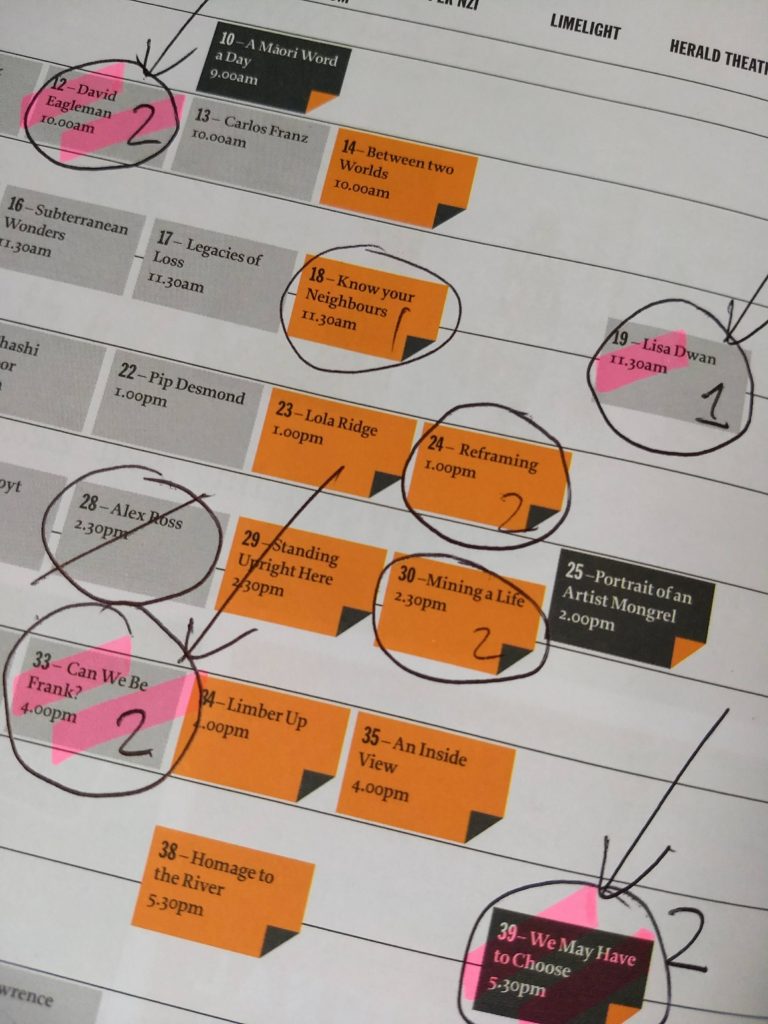 I love the Auckland Writers Festival. Every year I attend a few events, miss lots of good ones, and I always say that next year I will be better organised and see more. This year I took a day off work on the Friday so I could pack everything in to one day. I still didn’t get to everything I wanted to, but Joanne and I had a good day anyway. Here’s what we saw.
I love the Auckland Writers Festival. Every year I attend a few events, miss lots of good ones, and I always say that next year I will be better organised and see more. This year I took a day off work on the Friday so I could pack everything in to one day. I still didn’t get to everything I wanted to, but Joanne and I had a good day anyway. Here’s what we saw.
Articles about books
Auckland Writers Festival 2018
Twenty Thousand Leagues Under the Sea — Jules Verne
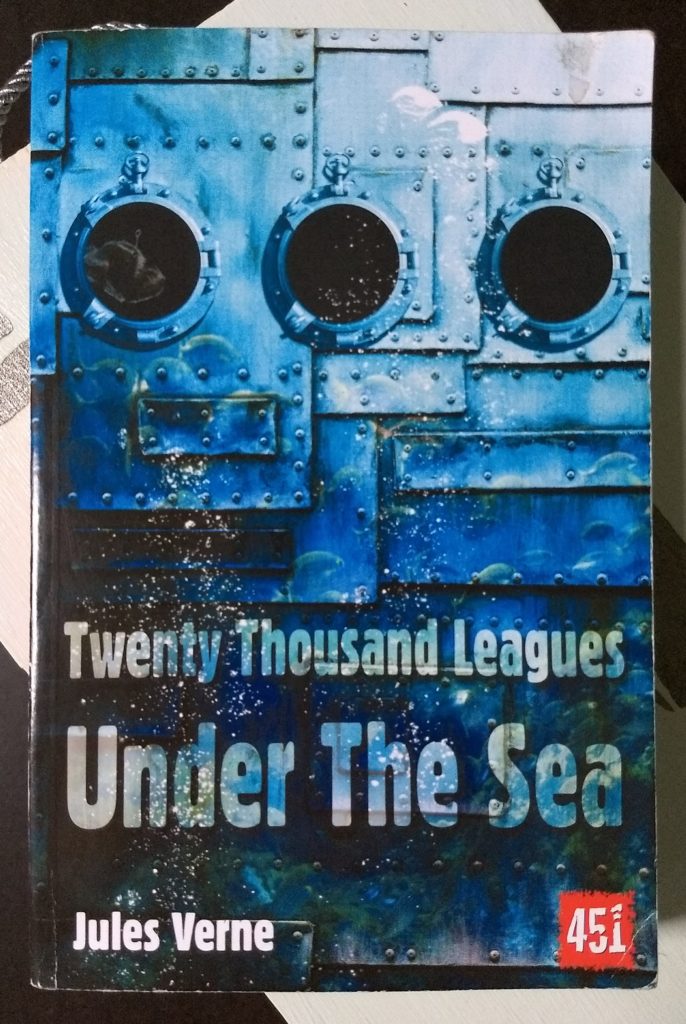 It’s good to finally read this famous book, starring the famous Captain Nemo and his famous ship the Nautilus, and discover that its fame is well-deserved: it’s a page-turning adventure story with drama, intrigue and nifty gadgets.
It’s good to finally read this famous book, starring the famous Captain Nemo and his famous ship the Nautilus, and discover that its fame is well-deserved: it’s a page-turning adventure story with drama, intrigue and nifty gadgets.
The narrator, a maritime expert, joins an expedition and eventually ends up aboard the Nautilus with couple of his companions. In a series of episodes we find out about the ship, a little about the captain, and a lot about various going-on under the sea. Verne puts a lot of really interesting and generally plausible ideas into the story, which is impressive for a speculative fiction written nearly 150 years ago. I have always wondered about the title though: I always thought that it referred to a depth of 20,000 leagues, but then I discovered that 20,000 leagues is about 100,000km, ten times deeper than any ocean. I now realise that it’s simply the distance travelled while under the sea — they circumnavigate the globe underwater, following a very meandering path.
The story was originally published in serial form, and it shows in the episodic structure. This makes it good to read bit by bit rather than all at once — very convenient for my morning and evening commute. This was recommended to me by Jay — I picked it because it stood out from most of his recommendations, which tend to be modern YA fiction. He’s also read other Verne stories: apparently Journey to the Centre of the Earth is good too.
The New Torchlight List — Jim Flynn
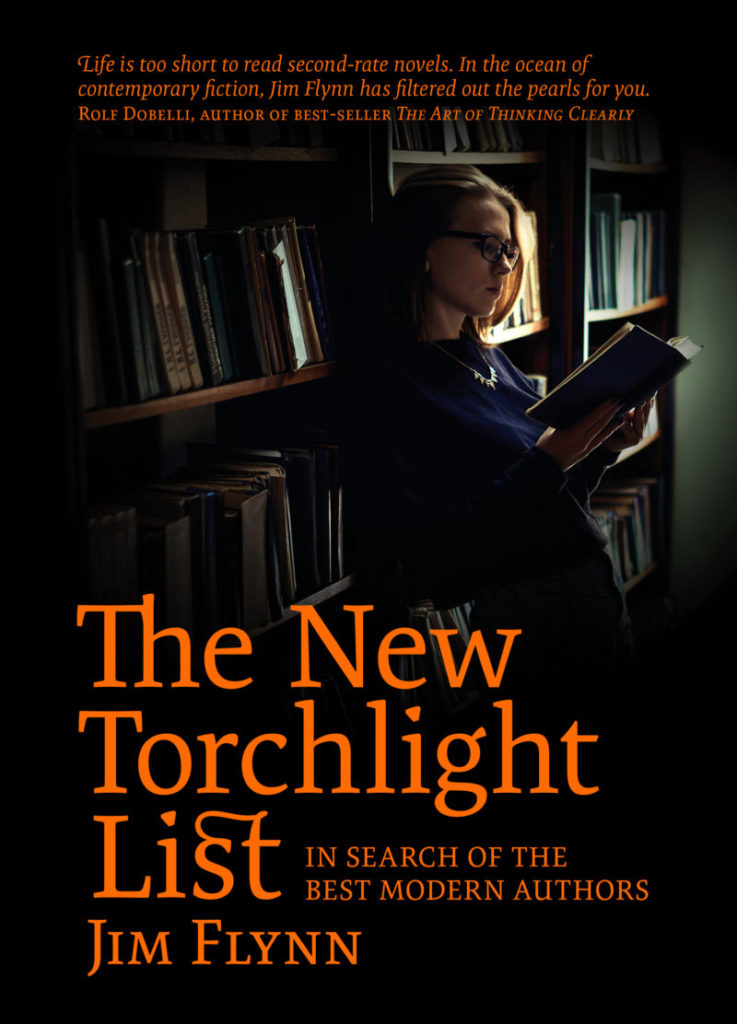 Jim Flynn’s first Torchlight List book was a really interesting guide to one man’s essential reading list. This follow-up takes a different tack but is just as engrossing. Here Flynn takes a more global view, focusing on different parts of the world and calling out books and writers that he thinks are worth reading.
Jim Flynn’s first Torchlight List book was a really interesting guide to one man’s essential reading list. This follow-up takes a different tack but is just as engrossing. Here Flynn takes a more global view, focusing on different parts of the world and calling out books and writers that he thinks are worth reading.
Flynn talks about the books and writers in the context of the countries and regions they come from. He gives excellent overviews of the various regions including their history and politics, which helps to explain the genesis of the different writers. I learned a lot just from these sections — they could almost be a book on their own.
12 Rules for Life — Jordan Peterson
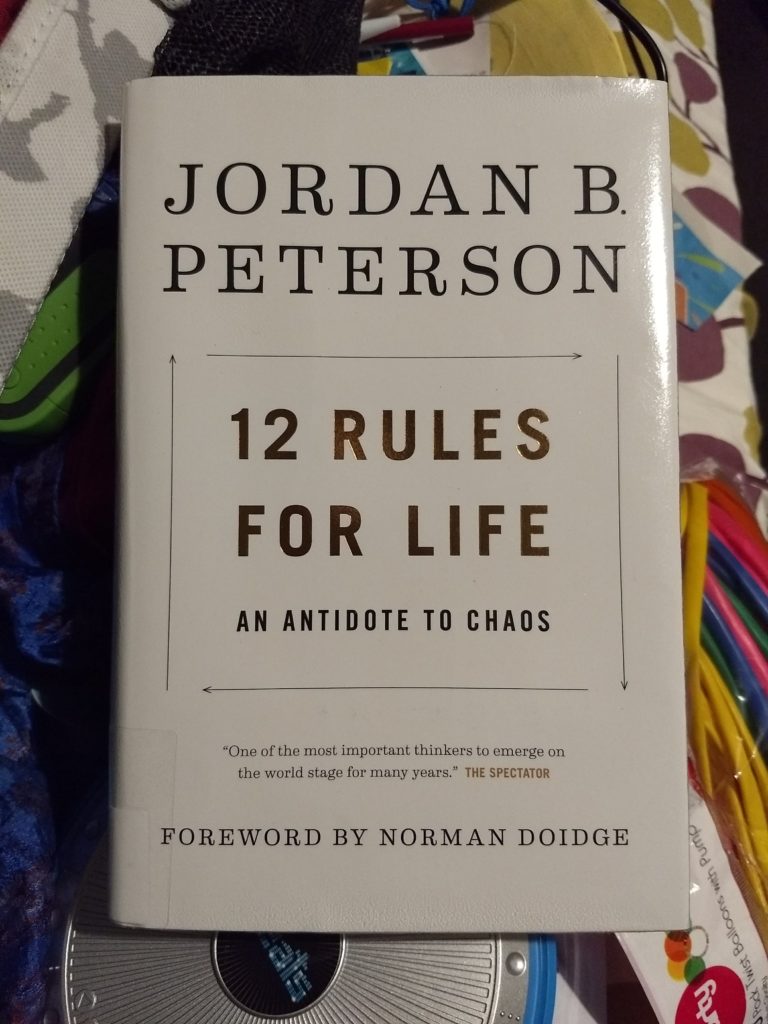 This is fun to read and it may change your life. The subtitle describes it best: chaos (particularly perhaps the chaos of the modern world) is what Peterson dreads, and he offers prescriptions, strategies and even commandments for how to preserve an ordered and civilised life from the relentlessly pounding waves of entropy. And all presented using language that virtually demands to be read out loud.
This is fun to read and it may change your life. The subtitle describes it best: chaos (particularly perhaps the chaos of the modern world) is what Peterson dreads, and he offers prescriptions, strategies and even commandments for how to preserve an ordered and civilised life from the relentlessly pounding waves of entropy. And all presented using language that virtually demands to be read out loud.
Each of the 12 homely “rules” is really just the starting point for a wide discussion of how life should best be lived. Peterson is a psychologist and a Christian, and those are the lenses through which he views the world. There is a lot about biblical history and teachings — a lot of it is presented as metaphor so it is still somewhat relevant to non-Christian and even non-religious people. But still, there is a lot more bible-bashing than I was expecting, even from such a famously conservative figure. Each of the 12 chapters ends with a restatement of the rule as its last sentence. For some reason I find this irritating and twee. And I normally like tweeness.
Owls Do Cry — Janet Frame
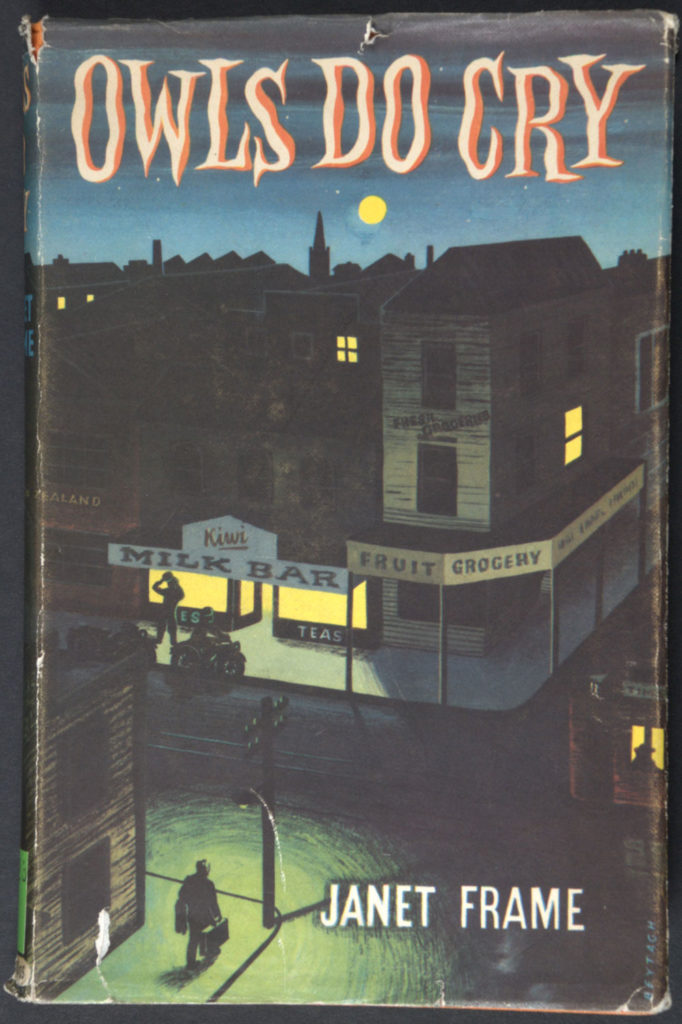 This is deservedly one of the classic New Zealand novels. When I returned it to the library, the librarian eagerly asked me how it was. I said it was really good — a novel version of Frame’s short stories. The shifting viewpoints give a broad understanding of the characters and events, and the impressionistic first-person narrative really made me feel what it must be like for the main character, living a life very different to mine. Bad things happen to her, but there are also many marvellous moments of beauty:
This is deservedly one of the classic New Zealand novels. When I returned it to the library, the librarian eagerly asked me how it was. I said it was really good — a novel version of Frame’s short stories. The shifting viewpoints give a broad understanding of the characters and events, and the impressionistic first-person narrative really made me feel what it must be like for the main character, living a life very different to mine. Bad things happen to her, but there are also many marvellous moments of beauty:
Continue reading
End as a Man — Calder Willingham
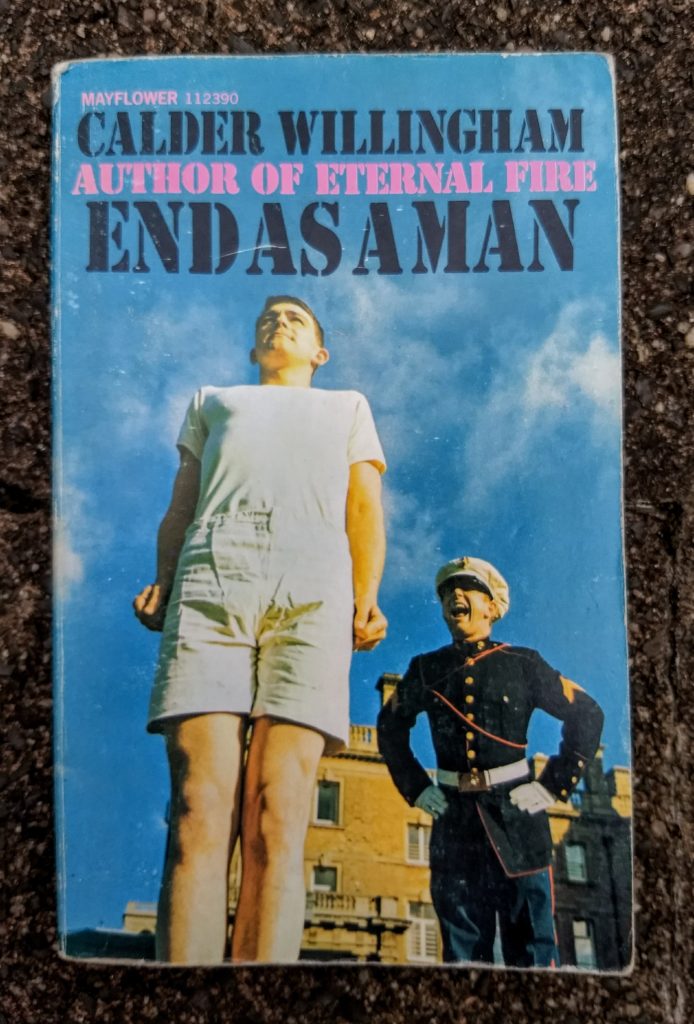 Jim Flynn put this book in his top 5 novels list, so I grabbed it when I found a copy recently. He said it was the greatest novel portraying contemporary American college life. “Contemporary” in this case means circa 1950, and it is actually set in a military college, so it’s presumably a bit different from a civilian college like Harvard or whatever. It does seem a bit bizarre, with the ubiquitous corporal punishment and merciless bullying of first-years by older students who are still just out of their teens. I don’t know whether this weirdness is due to being 60 years ago, being American, being a military school, or being a work of fiction. I suppose it’s all four, but I do get the impression that the general features of the books’s college life are based on fact. Holy cow, what a hell-hole it must have been.
Jim Flynn put this book in his top 5 novels list, so I grabbed it when I found a copy recently. He said it was the greatest novel portraying contemporary American college life. “Contemporary” in this case means circa 1950, and it is actually set in a military college, so it’s presumably a bit different from a civilian college like Harvard or whatever. It does seem a bit bizarre, with the ubiquitous corporal punishment and merciless bullying of first-years by older students who are still just out of their teens. I don’t know whether this weirdness is due to being 60 years ago, being American, being a military school, or being a work of fiction. I suppose it’s all four, but I do get the impression that the general features of the books’s college life are based on fact. Holy cow, what a hell-hole it must have been.
So the characters end up in various unedifying situations, usually of their own making, and we see them as they deal with things, usually badly. It becomes apparent that the novel mostly concerns the misfits and bad hats of the academy, which explains a lot about the dramas that befall them. The book ends with a couple of eloquent and very different speeches, and closes with just deserts all round.
Proofiness – Charles Seife
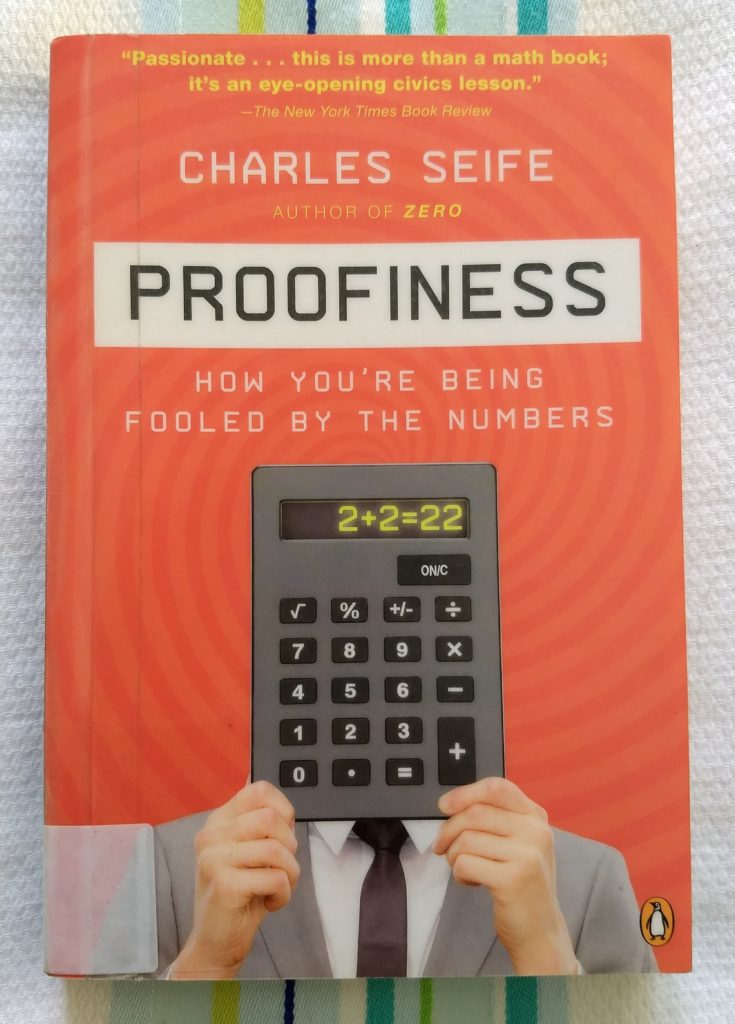 This is a great survey of all the ways to lie with statistics, and how to avoid being fooled by them. So many of the things we read and hear are based on numerical data, and often it’s hard to argue with them — “the numbers don’t lie”, they say. And it’s true: numbers don’t lie. But people lie, sometimes using words and sometimes using numbers.
This is a great survey of all the ways to lie with statistics, and how to avoid being fooled by them. So many of the things we read and hear are based on numerical data, and often it’s hard to argue with them — “the numbers don’t lie”, they say. And it’s true: numbers don’t lie. But people lie, sometimes using words and sometimes using numbers.
There are sections on politics, discussing gerrymandering and also counting election results. Seife’s analysis of the 2000 US presidential election is excellent, laying bare the frankly ridiculous voting systems in use. He also reveals what the actual result should have been, after all the court cases and recounts. His conclusion surprised me, but it is actually the only sensible option even though it would probably have caused outrage.
How to Bake π — Eugenia Cheng
 The whole idea of mathematics is to make things easier. It allows us to understand the world is ways that would be impossible without it. So it’s a great shame that many people see it as shrouded in mystery. Eugenia Cheng tries to overcome this problem in this book about mathematics and cooking (and in some cases, the mathematics of cooking).
The whole idea of mathematics is to make things easier. It allows us to understand the world is ways that would be impossible without it. So it’s a great shame that many people see it as shrouded in mystery. Eugenia Cheng tries to overcome this problem in this book about mathematics and cooking (and in some cases, the mathematics of cooking).
The intricate details of mathematics can be tricky to get straight, but the concepts should be intelligible if presented properly. In this book, Cheng works towards an understanding of Category Theory, her own specialist area of mathematics. (I think this is the “mathematics of mathematics” mentioned in the subtitle.) Each chapter starts with a simple recipe, which Cheng uses to illustrate a mathematical concept. This strategy works well: you really get a good idea of what the concept is and why it’s useful, without getting hung up on complexities.
Dept. of Speculation — Jenny Offill
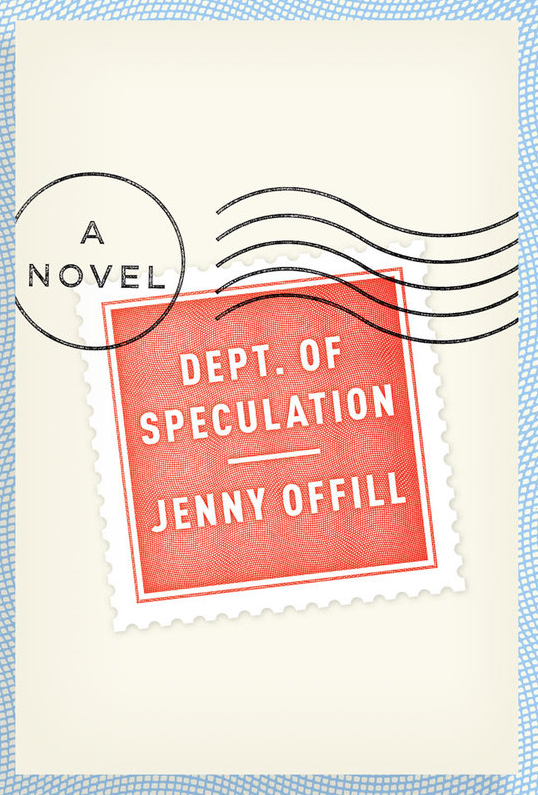 This small but perfectly-formed book is a simple story of girl meets boy and all the usual things that follow. But it’s told in an unusual way so that I sometimes felt as if I was inside the main character.
This small but perfectly-formed book is a simple story of girl meets boy and all the usual things that follow. But it’s told in an unusual way so that I sometimes felt as if I was inside the main character.
The viewpoint changes around a bit, and the tone varies from personal to almost clinical at times. But even so, there is so much insight here, like this heart-rending evocation of the isolation of a new mother whose partner is away during the day:
What did you do today, you’d say when you got home from work, and I’d try my best to craft an anecdote for you out of nothing.
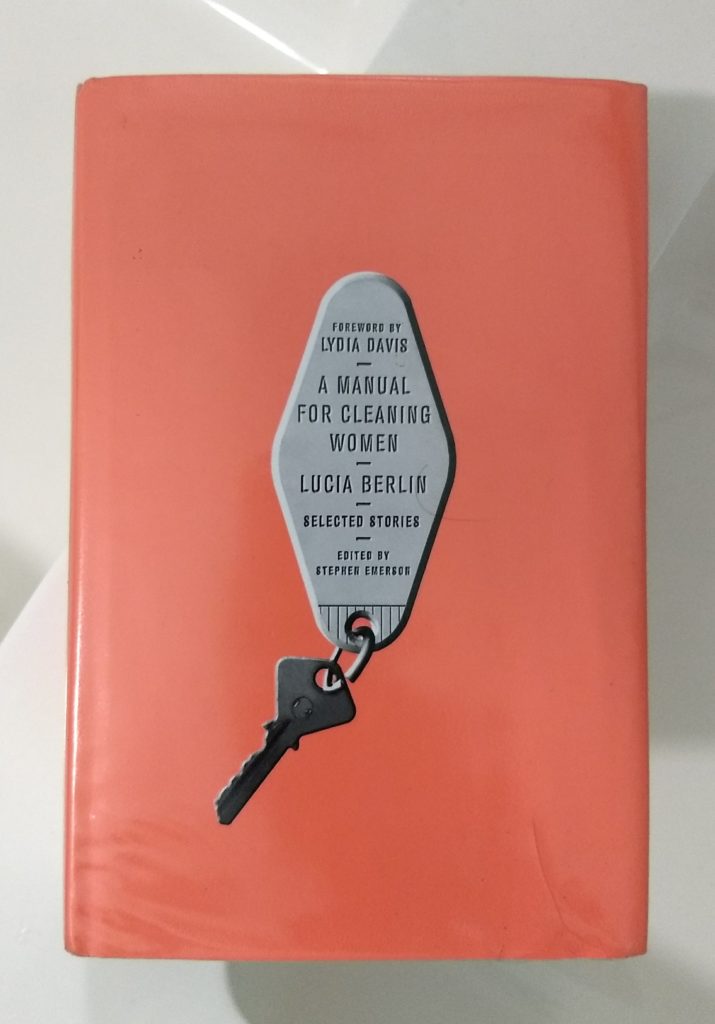 Squalor and alcoholism feature prominently in these short stories based on Berlin’s life. Many of the stories concern marginalised people: they suffer so much injustice but still manage to keep going. Even so, I wouldn’t describe the stories as uplifting.
Squalor and alcoholism feature prominently in these short stories based on Berlin’s life. Many of the stories concern marginalised people: they suffer so much injustice but still manage to keep going. Even so, I wouldn’t describe the stories as uplifting.